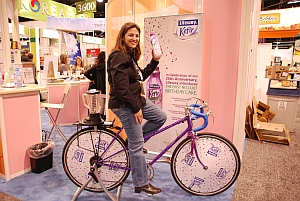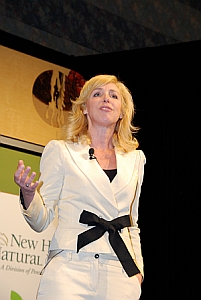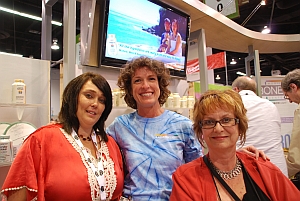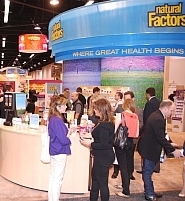Anaheim, CA—Natural Products Expo West has further solidified its place as the biggest natural and organic products tradeshow on the planet, with record attendance for its 2011 stint. More than 58,000 industry members came out for the Anaheim, CA-located show (held March 10–13), which was once again co-located with SupplyExpo 2011. The 2010 show hosted about 56,000 attendees.
Expo West 2011 was said by many to be the strongest show the industry has seen in years, ripe with buyers buying—not just looking. Lisa Delezol, president, Emerita, Portland, OR, stated “We’ve turned a corner with this show. It’s evident in the strong traffic and the fact that visitors to the booth are not here merely to discuss what’s new, but to purchase what’s new.” Retailer attendee Soloman Romano of linelabs, Burbank, CA, said of his Expo West experience, “There’s a huge variety of opportunities for retailers...it’s like one-stop shopping.”
For Mike Fata, CEO and co-founder of Manitoba Harvest, the Expo West 2011 atmosphere far exceeded his expectations from previous shows. “For the last couple of years, the feedback has been that interest in the shows is slowing. But this year, it’s been over the top,” he said.
 |
||||
| Lifeway Foods' national sales director Amy Feldman holds a bottle of special flavor Birthday Cake Kefir, developed for the company's 25th anniversary, as she poses on a bicycle that will tour 10 selected cities to raise $25,000 for the Healthy Kids Challenge program. |
Suppliers, too, had a strong presence at the show. Jarrow Rogovin, president of Jarrow Formulas, stated, “I have personally been busy working with suppliers, and the meetings have been very beneficial. On a personal level, the Expo is always good for getting together with old and dear friends.”
In all, Expo West 2011 was a hit with newcomers and veterans alike. Said Pierce Soussat, president Bioforce USA, Ghent, NY, “I have been coming to Expos since the first show, and I’m pleasantly surprised that it has grown so much [from 3,000 square feet of exhibit space in 1981 to more than 300,000 square feet this year], yet it still remains relevant for small- to medium-sized manufacturers. In the old days, the retailers used to be motivated mainly by show special discounts. Now, they are more interested in what products do and how they are supported with marketing sell-through programs.”
Top Take-Home Points from Expo Sessions
Once again, thousands of attendees filed into the show’s diverse seminars and educational events. The following are just some of the main take-home messages from these sessions:
- Up to 50% of the U.S. population may be diabetic by the end of this decade and stores better be ready, said Martie Whittekin, CCN, in “Your Store & the Diabetes Epidemic—A Better Approach” (sponsored by Lily of the Desert). Whittekin detailed the potential burden that diabetes could place on our nation’s health and economy. Store owners were encouraged to actively position their products as an option for diabetic customers.
- Industry can use the Ecolabel Index (www.ecolabelindex.com) to keep on top of 378 eco-labels in 211 countries throughout 25 industry sectors. An expert panel in “Cleaning up the confusion; Eco-Labels on Natural & Organic Household Products” discussed the virtues of the various eco-friendly seals and how they can help manufacturers and inform consumers.
- Retailers play an important role in keeping adulterated supplements off store shelves—even if they sell well, said Cheryl Hughes, owner/founder of The Whole Wheatery LLC in the “Adulterated Supplements” seminar. This session focused on the role of different industry sectors in preventing adulterated products from entering the market. Other panelists emphasized that it is incumbent upon the industry to prove to the government that it can self-regulate. The Council for Responsible Nutrition was suggested as a source for determining what’s legit and what isn’t and examining the profile of certain supplements.
- Deregulated GMOs are endangering the organic industry and a renewed level of commitment is needed to meet the growing challenges. In the well-attended “GMO and Political Challenges to Organic for 2011 Beyond” session, concerns and calls to action were aired over the recent deregulation of genetically modified crops, the challenge to organic seed integrity, and the future of organic agriculture in general. Founder and CE-Yo of Stonyfield Farm Inc. Gary Hirshberg said, “Most importantly from where I sit right now, 18 months away from an election, we need an enormous consumer and voter effort.”
 |
|
| Keynote speaker Bridget Brennan discusses marketing to women shoppers |
- Research says Maitake mushroom supplementation may benefit those with metabolic syndrome, stated Harry Preuss, M.D., at a breakfast hosted by Mushroom Wisdom, Inc.
- Strong science and successful ingredients go hand in hand. In “State of the Industry: The Power of Ingredient Branding,” a panel considered the relative value of science versus marketing when it comes to ingredient branding. The main message was to make it in this industry, suppliers must have reliable and meaningful data before attempting to translate it into marketing messages. The question remains: Will companies conduct a lot of scientific studies or just enough to get by?
- Businesses can be green with the right tools. At “Green Sourcing for Retailers,” researchers talked about the process of creating more efficient distribution and supply networks and lessening their overall ecological impact. An expert described how one supermarket chain has gone about implementing various in-store eco-friendly solutions, and how they have been able to convey those efforts to consumers.
- Curcuminoids have excellent bioavailability and potential to serve as “bioprotecting” antioxidants, according to speakers in “NutriCosmetic Benefits of Healthful Curcuminoids and Beyond” (sponsored by Sabinsa Corp.). The compounds have been found to inhibit the COX-2 inflammatory pathway without producing any gastrointestinal side effects. Due to its neuro-protective properties, curcumin was also indicated as a potentially beneficial supplement for Alzheimer’s patients.
- Citicoline may help improve brain metabolism and cognitive performance, said presenters in “Cognizin Citicoline: New Science Supporting Attention, Focus, Memory and Recall” (sponsored by Kyowa Hakko). Speakers gave attendees a look at new research into the brain health applications of Cognizin, a form of the natural chemical citicoline. Through a series of experiments involving adult human populations, it was demonstrated how Cognizin could improve brain metabolism and cognitive performance.
- Astaxanthin is the most powerful antioxidant on the planet, according to “Suzy Cohen, R.Ph., and Robert Corish, M.D., Discuss Astaxanthin and Spirulina” (presented by Nutrex-Hawaii). Corish highlighted the nutritional profile of astaxanthin, which is said to boost good cholesterol and lower levels of pro-inflammatory C-reactive proteins. Cohen classified Hawaiian spirulina as a superfood, describing how it can increase energy, alleviate pain and provide myriad other benefits.
- Featured speaker Lynne Twist, co-founder of the Pachamama Alliance, said each day, Americans discard 631 million plastic bottles, Twist said we should no longer use the phrase “throwing it away.” “There is no away,” she emphasized. According to the speaker, the next four years will prove critical in the struggle to save the rainforests. For that reason, there is now a major worldwide advertising campaign being created by Wieden & Kennedy, the world’s largest international ad agency. Identified as “Four Years. Go. (4YG),” the ad campaign seeks “to build a global movement of commitment and action that will cause a positive tipping point in humanity’s future by the end of 2014, setting us irreversibly on a new path to a just, thriving and sustainable future for all.”
- In the “State of the Industry,” Patrick Rea, publisher and editor of Nutrition Business Journal (NBJ), noted that, even though the shaken economy of the past few years has slowed growth in the natural products sector, it is still growing. He said sales of natural and organic foods reached $40 billion, an increase of between 7% and 8%. Personal care items rang cash registers to the tune of about $15 billion, and household products reached $2.8 billion. Dietary supplements, up 6%, climbed to $28 billion. Within the supplement sector, meal replacements soared 14%, minerals were up 7%, vitamins up 5%, and homeopathy up 1%. Only herbs, down 1%, lost ground. Carlotta Mast, editor-in-chief of www.newhope360.com, offered “Four Market-Moving Macro Truths No One Should Ignore.” Number one, the customer base is changing; it now includes a growing number of Hispanics, a group that continues to grow in size and market influence. Truth number two: Food recalls and disclosures about deceptive product practices like Taco Bell’s “beef” have scared consumers into caring about what they put into their bodies. Manufacturers and retailers must recognize that transparency matters. Truth number three: Social media is no longer just about personal trivia. Be aware that consumer criticism on Facebook and its ilk can make or break you. Truth number four: Although “Big Business still rules the world, power is shifting to consumers.” Dave Kingsbury, New Hope’s vice president of new business and new product development, reminded his audience that despite all its strides into the public consciousness, natural product still only command about 4% of sales. Total monthly volume of Whole Foods Markets is reached in just seven days by Safeway, and in 60 seconds by Wal-Mart, he stated. Kingsbury urged industry members to approach customers and non-customers with education, affordable prices and greater availability and selection. He also said, “We have to stop talking to each other and start talking to those who are not yet shopping at our stores.”
- In “What Are Shoppers Thinking?” Bill Crawford, M.S., a veteran of New Hope Natural Media, offered insights into shoppers’ behavior. He noted that 85% of all brand purchases in the United States are made by women, and that percentage expands to 91% when food purchases are considered specifically. Reporting on a survey of 4,898 people in all sorts of venues, participants’ top three stated goals were: 1) Lose weight; 2) Maintain a healthy lifestyle; 3) Feel good about myself. Invariably, the respondents placed others—spouses, children, parents, etc.—above themselves as the primary target of health-oriented products. Major impediments to selecting healthy products were lack of money, time (to shop for or prepare healthy foods), and will power. Virtually all participants acknowledged room for improvement in their lifestyle. The top three label claims influencing their buying decisions were: 1) high fiber; 2) reduced fat (or fat-free); and 3) low sodium.
- Three speakers—Steve Mister, president/CEO of the Council for Responsible Nutrition, Washington, DC, Don Summerfield, vice president of integrative medicine for Pharmaca Integrative Pharmacy, Boulder, CO, and attorney Ivan Wasserman, partner in Manatt Phelps and Phillips, Washington, DC—sketched a road map of permissible speech and written communication for retailers to use when interacting with consumers in “What Retailers Can Say to Customers.” For example, can a retail salesperson describe how a supplement helped him or her? No, says Mister. Because the salesperson has a financial interest, such a story would be improper, according to Mister. Can the salesperson give a best-case scenario on the results to be expected with a supplement? No, he or she must relay information on what the average results have been. Summerfield says stores can benefit from employee training about working with customers that includes role play. For example, if a shopper asks what can be taken for diabetes, the answer might be, “We offer many supplements that help to support healthy blood sugar levels. We also have literature that addresses these issues.” He further recommends that the clerk end the conversation by recommending that the shopper take the information back to his/her doctor and solicit an opinion there. Wasserman, however, warned his audience, that improper statements by store sales staff may result not only in fines but in lawsuits. If a consumer were to take the retailer’s advice and then become sicker, or even die, the ultimate penalty may be a very large judgment against the store.
- In “Why She Buys,” keynote speaker Bridget Brennan, CEO of Female Factor, noted the gender gap in business: 80% of the consumers are women, and 90% of the manufacturers and retailers are men. Brennan said what men don’t get when selling to women is that a woman doesn’t purchase a product strictly because of its functionality, durability and safety. For the distaff side, it’s also about emotions, style and eye appeal. She offered the following clues on how to generate an effective emotional contact with women: Make her feel confident, inspired, connected and recognized. Always keep in mind that women want to feel appreciated.
- Registered pharmacist Suzy Cohen believes drugs are overused in our society. In “Drug Muggers” sponsored by Essential Formulas, Inc., she noted that half of all Americans take at least one drug and one in 10 people take five or more drugs. In her latest book, Cohen defines drug muggers as “an OTC or prescription medication, food, herb, medical condition or lifestyle choice that is capable of robbing the body of natural vitamins, minerals and hormones.” Examples are statins that suppress CoQ-10, coffee that leeches iron, nicotine, which mugs thiamine and vitamin C, and alcohol, which is like “a bullet to the pancreas.”
- Well-known author and consultant Michael T. Murray, N.D., focused on products and ingredients with potential for strong future sales in “Tomorrow’s Best Sellers.” Pyrroloquinoline quinone (PQQ), he said, is a vitamin-like cofactor that, via cell signaling, may promote generation of new mitochondria. Noting that it is an “exceptional antioxidant,” Murray said it may enhance the effectiveness of CoQ-10, and also cited a study in which PQQ and CoQ-10 used in conjunction speeded up thought and recognition processes. Murray also called attention to baobab as “poised to become the next big superfruit.” The baobab produces a fruit with high vitamin C content, calcium, carbohydrates, dietary fiber, iron, magnesium, phytochemicals, potassium, protein, and vitamin B1. ORAC value has been measured at more than 50,000u/100g. Quercetin, he said, is one of his “favorite flavonoids.” At 1 gram per day, he said, it has been shown to improve athletic performance by optimizing upper respiratory activity. And now there is enzymatically modified isoquercetin, which is more readily absorbed. According to Murray, one study indicated that this newer form of the nutrient may be able to reduce hay fever symptoms.
- In a presentation sponsored by National Enzyme Company (NEC), surgeon and researcher Paul Nemiroff, Ph.D., M.D., FACS, indicated that few doctors share information about the benefits of enzymes because they are unaware. Medical schools do not teach about enzymes, he said. Moreover, he said, many physicians fear malpractice suits should they use substances that lack FDA approval (in actuality, the speaker said, dozens of enzymes are listed in the PDR). Medical dogma—the “we’ve always done it this way” syndrome—is another barrier to wider use of enzyme therapy. According to Nemiroff, many doctors believe that enzymes are simply too big to be absorbed. Yet, he added, there are some remarkable discoveries showing the value of these nutrients.
- Not all juicers are made the same, according to a presentation from Tribest. The speakers recommended a therapeutic juicer (average 3,000 rpm) that can “explode the cell walls of the fruit or vegetable to deliver the full nutritional value.”
On the Show Floor
With more than 3,500 exhibit booths, attendees had much to see on the tradeshow floor. Here are some trends on the show floor, noted by WholeFoods editors:
- A wave of liquid supplement shots is hitting the market, such as a new condition-specific line from I Am.
- Companies have continued interest in probiotics, with several companies launching clinical-grade lines.
- In the food aisles, condiments and finishing sauces were popular with new launches by several companies.
- Innovations in eco-friendly packaging was more abundant than ever (see this month’s Green News for more).
- Omegas were hot as always and Expo West offered some unique launches such as New Chapter’s Wholemega line.
- Anniversary celebrations were had by numerous companies including Kamut International, which had a celebratory cake cutting and cowboy hat-toss to celebrate its 25th year; Rainbow Light rang in Number 30; Bluebonnet Corporation celebrated its 20th anniversary; Mushroom Wisdom turns 20 this year; Lifeway Foods celebrated its 25th; Nebraska Cultures had a party in honor of its 30th birthday; and a cocktail party was held to celebrate the 35th anniversary of Once Again Nut Butter.
 |
|
| Rainbow Light founder and president Linda Kahler is flanked by retailers Jennifer Encinas (left) and Jaylene Nuttall (right), both of Sunflower Farmers Market in Phoenix, AZ. The occasion--Rainbow Light's 30th anniversary in business, celebrated with a lavish party, refreshments and a live band on the exhibit floor. |
The Nightlife
Held the night prior to the show in the Diamond Club at Angels Stadium of Anaheim, the League of Angels event presented by Vitamin Angels raised awareness for their charitable work in improving the nutrition of underserved child populations. Over 300 attendees heard former baseball player Jay Johnstone and NFL All-Pro player for the Vikings Robert “Griff” Griffith praise the work of the organization; listened to a Kenyan national describe first-hand the benefits of early nutrition funded by charitable donations; and watched a 16-year-old girl describe her fundraising efforts after being inspired by Vitamin Angels. Attendees also heard a special musical performance by Thick as Thieves. The heavily attended party was bolstered by a serious message. Howard Schiffer initially formed to make sure that children in impoverished living conditions had access to adequate vitamin A to preserve their eyesight. Vitamin Angels reached some two million recipients in its first year. This year, it will reach approximately 24 million needy children at a cost of about 25 cents per child per year. That, said Schiffer, is equal to filling Angel Stadium’s 45,113 seats almost 532 times.
At the 8th annual Night to Reunite benefit dinner hosted by The Organic Center, keynote speaker Ken Cook said, “Organic is the envy of the food industry in every respect that matters.” He and other organic leaders, along with several video presentations, emphasized the importance of the fight organic now faces against the conflicting interests of mainstream agriculture. They discussed regulatory issues, presented awards to individuals who have advocated well for organic causes, and celebrated the benefits of eating organic food.
Of note, the Organic Center announced a new research project being conducted in conjunction with the Natural Marketing Institute, which is intended to “help to increase consumer understanding of the difference between organic and conventionally grown foods.” The study starts next month and finishes in January 2012; research will include syndicated data analysis, in-home studies, consumer shopping research, questionnaires and organic messaging plus 15 category surveys with 4,000 U.S. adults.
Wakunaga of America Co. Ltd. featured two speakers at its annual dinner for retailers. Sherry Torkos, R.Ph., B.Sc.Phm., co-author of Saving Women’s Hearts, focused on what can be done to lower the 8.6 million heart-attack deaths suffered each year by women worldwide, and Susan Smith Jones, Ph.D., discussed key steps to a balanced life. Torkos said women with the same symptoms as men are more likely to be treated for emotional or digestive upset than for a heart-related emergency. Calling stress “the trash of modern life,” she warned women, “If you don’t dispose of it properly, it will pile up and may eventually take your life.” Jones outlined what she called “10 sacred practices for radiant health.” They include: 1) Keep yourself fit, eat right, drink lots of water and exercise; 2) Be a shining example of radiant health; 3) Shed feelings of anger, despair, etc.; 4) Think positive thoughts; focus on what you want in life; 5) Visualize you whole day in a few minutes; 6) Develop your sense of humor; 7) Simplify your life; 8) Let your inner child come out and play; 9) Try to find a little time each day to be by yourself; and 10) Learn to follow your inner guidance throughout life.

|
|
| Activity on the show floor. |
Award Winners
Numerous awards were presented at Expo West this year. derma e Natural Bodycare of Simi Valley, CA, gave Presence Marketing Southwest its 2010 Broker of the Year. “This annual award is given to the brokerage group that achieves a high level of success based on parameters such as increased sales, effective communication, efficiency, pro-activity and innovation,” says the firm.
The annual NutrAwards were presented at Nutracon to DSM Nutritional Products in the Best New Ingredient category for its Fruitflow, water-soluble tomato-based concentrate; Ganeden took home the prize in the finished product category for its Good Cacao superfood chocolate.
The American Botanical Council honored individuals and companies with its Botanical Excellence Awards. Aviva Romm, M.D., received the ABC James A. Duke Excellence in Botanical Literature Award for her book, Botanical Medicine for Women’s Health. The ABC Norman R. Farnsworth Excellence in Botanical Research Award was given to A. Douglas Kinghorn, Ph.D., of Ohio State University. And the ABC Varro E. Tyler Commercial Investment in Phytomedicinal Research Award went to New Chapter Inc.
Sherbrooke Capital gave its third annual Entrepreneurship Awards to Good For You Girls in the under $5 mm category and Justin’s Nut Butters in the greater than $5 mm category. “Awards were given to companies that demonstrated excellence in innovation, either through product development, branding and positioning, or sales strategy,” according to Sherbrooke Capital.
Published in WholeFoods Magazine, May 2011 (online 3/21/11)










